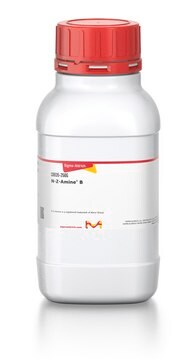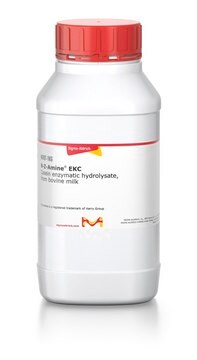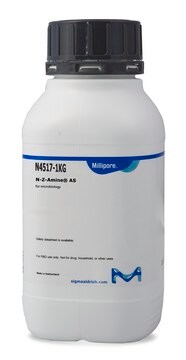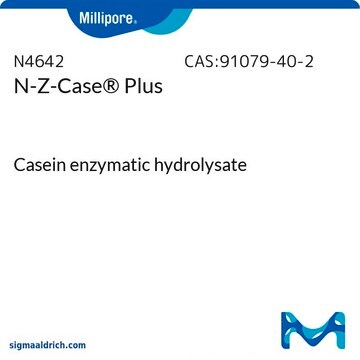Recommended Products
biological source
Porcine
bovine
Quality Level
description
Amino nitrogen ≥ 8%
Total nigrogen ≥11%
form
powder
technique(s)
microbiological culture: suitable
Looking for similar products? Visit Product Comparison Guide
Application
N-Z-Amine® has been used in culture mediums to grow and produce enterotoxins by Staphylococcus.
Quality
Preparation has a high level of free amino acids.
Legal Information
N-Z-Amine is a registered trademark of Kerry Group
Storage Class Code
11 - Combustible Solids
WGK
WGK 1
Flash Point(F)
Not applicable
Flash Point(C)
Not applicable
Personal Protective Equipment
dust mask type N95 (US), Eyeshields, Gloves
Certificates of Analysis (COA)
Search for Certificates of Analysis (COA) by entering the products Lot/Batch Number. Lot and Batch Numbers can be found on a product’s label following the words ‘Lot’ or ‘Batch’.
Already Own This Product?
Find documentation for the products that you have recently purchased in the Document Library.
Staphylococcus aureus enterotoxin B release (excretion) under controlled conditions of fermentation.
J F Metzger et al.
Applied microbiology, 25(5), 770-773 (1973-05-01)
Release of Staphylococcus aureus enterotoxin B (SEB) into the culture medium was initiated during the mid-log phase of growth. A medium consisting of 4% N-Z Amine A (Sheffield), 0.2% dextrose, and 1% yeast extract supported maximum production of SEB. Although
C Genigeorgis et al.
Applied microbiology, 21(5), 862-866 (1971-05-01)
Growth and production of enterotoxin C by Staphylococcus aureus strain 137 in 3% + 3% protein hydrolysate powder N-Z Amine NAK broths with 0 to 12% NaCl and an initial pH of 4.00 to 9.83 were studied during an 8-day
T N Morita et al.
Applied and environmental microbiology, 38(1), 39-42 (1979-07-01)
From comparisons of 4% N-Z Amine NAK made with distilled water, naturally hard water, and synthetic salt solutions, it appeared that magnesium and, to a lesser extent, iron were limiting factors in the production of staphylococcal enterotoxins B and C
Our team of scientists has experience in all areas of research including Life Science, Material Science, Chemical Synthesis, Chromatography, Analytical and many others.
Contact Technical Service








